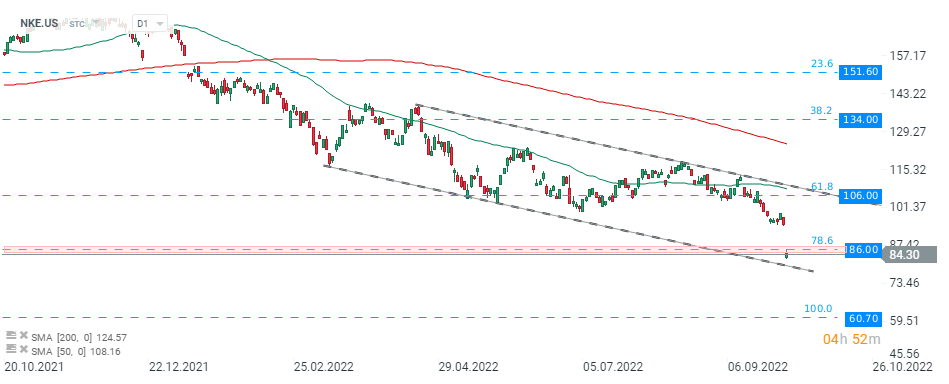Nike (NKE.US) stock fell over 11.0% on Friday as better-than-expected quarterly results were overshadowed by excess inventory levels. Other retailers were also dragged down, with Lululemon Athletica (LULU.US) and Under Armour (UA.US) losing almost 6% and nearly 5% respectively.
- The sneaker and apparel maker reported Q1 revenue of $12.7 billion, up 4% YoY, beating market estimates of $12.27 billion. Company earned 93 cents per share, slightly above Wall Street consensus of 92 cents per share.
- However inventory on its balance sheet increased to 44% to $9.7 billion, driven by continued supply chain issues.
- As delivery times and consumer demand rose this year, retailers responded by ordering inventory earlier than usual. When in-transit shipping time improved significantly over the summer, it left Nike with excess inventories, CFO Matthew Friend said.
- In order to unwind the excess inventory, the company is planning to offer more discounts ahead of the holiday season, which only pushed stock price lower.
 Nike (NKE.US) stock launched today's session with a massive bearish price gap and is currently trading below 78.6% Fibonacci retracement of the upward wave launched in March 2020 around $86.00. If sellers manage to break below the lower limit of the descending channel, then downward move may deepen towards pandemic lows at $60.70. Source: xStation5
Nike (NKE.US) stock launched today's session with a massive bearish price gap and is currently trading below 78.6% Fibonacci retracement of the upward wave launched in March 2020 around $86.00. If sellers manage to break below the lower limit of the descending channel, then downward move may deepen towards pandemic lows at $60.70. Source: xStation5

Market Wrap: Europe is back to green 🇪🇺 📈 Business activity finally accelerating ❓

Blue Owl Capital: Local issue or a “Lehman moment”?

US OPEN: Moderate declines amid risks and data

Michael Burry and Palantir: A well-known analyst levels serious accusations


